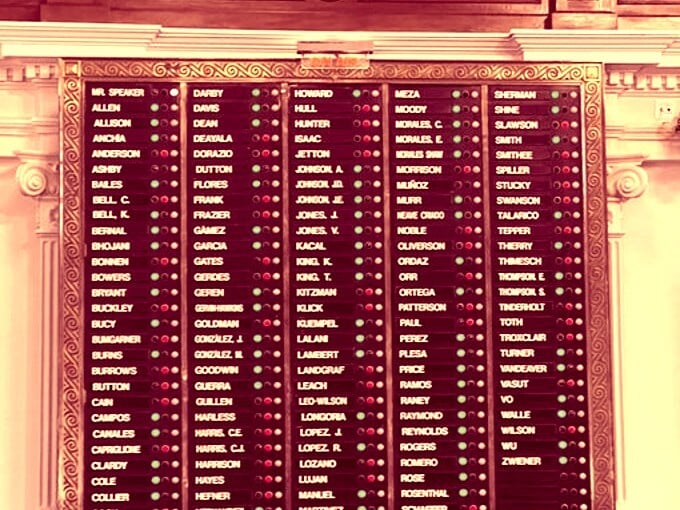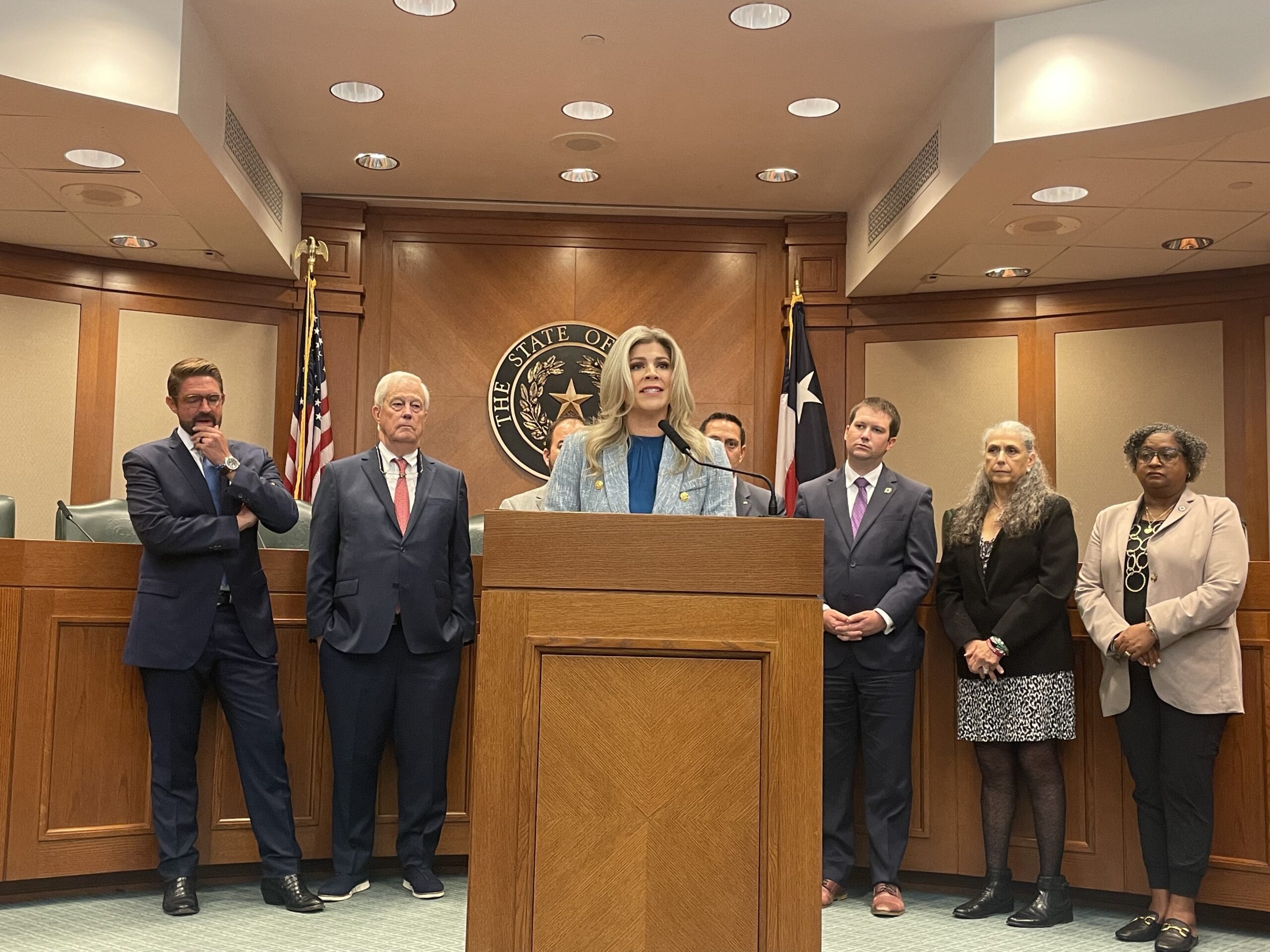
Seven Anti-LGBT Laws That Remain on Texas’ Books
Democrats again seek to repeal discriminatory measures, but LGBT advocates say it’s unlikely.

Seven Anti-LGBT Laws That Remain on Texas’ Books
Democrats again seek to repeal discriminatory measures, but LGBT advocates say it’s unlikely.
Although their efforts have been largely overshadowed by proposed anti-LGBT legislation, Democratic state lawmakers have pre-filed 15 pro-LGBT bills in advance of the 2017 session, according to Equality Texas.
Six of the pro-LGBT measures aim to repeal existing anti-LGBT laws — from the state’s 1973 ban on “homosexual conduct” to its 2005 constitutional amendment banning same-sex marriage.
Several of the anti-LGBT laws targeted for repeal are unenforceable because they’ve been declared unconstitutional by the U.S. Supreme Court. But others, such as a ban on promoting homosexuality in public schools and a prohibition on consensual sex between gay teens, threaten real-world discriminatory impacts.
Bills to repeal anti-LGBT laws have been introduced in at least the last six biennial legislative sessions, but none has ever passed. Given the makeup of the current Legislature, LGBT advocates say it’s unlikely the repeal proposals will fare any better in 2017.
Here’s a look at seven anti-LGBT laws that remain on Texas’ books.
‘Homosexual Conduct’ Law
Section 21.06 of the Penal Code, passed in 1973, states that gay sex is illegal in Texas. Under the law, “homosexual conduct” — defined as “deviate sexual intercourse with another individual of the same sex” — is a class-C misdemeanor, punishable by a fine of up to $500. The U.S. Supreme Court struck down the law as unconstitutional in Lawrence v. Texas in 2003. Despite the ruling, Texas is one of 12 states with so-called sodomy bans still on the books, and one of three where the laws specifically target homosexual activity. Proponents of repealing the laws argue they create confusion, pointing to cases in which police have attempted to enforce them. In 2009, El Paso police threatened to arrest several gay men for “homosexual conduct” after two of them kissed in a restaurant, resulting in a lawsuit against the city that was settled out of court. Bills to repeal Texas’ sodomy ban have been introduced in every legislative session since 2005, but never made it out of committee.
‘No Promo Homo’ in Schools
According to Section 85.007 of the Health and Safety Code, materials used in education programs for people under 18 in Texas must state that “homosexual conduct is not an acceptable lifestyle and is a criminal offense.” Meanwhile, Section 163.002 requires that course materials and instruction in sexual education include “emphasis, provided in a factual manner and from a public health perspective, that homosexuality is not a lifestyle acceptable to the general public and that homosexual conduct is a criminal offense.” LGBT advocates refer to these provisions as “no promo homo” laws, and Texas is one of eight states where they remain in effect. In October, LGBT advocates filed a federal lawsuit alleging that Utah’s “no promo homo” statute is unconstitutional, saying they hoped the case would set a precedent for the laws to be struck down nationally.
Texas DOMA
Sec. 6.204 of the Texas Family Code states that a marriage or civil union between two people of the same sex is “contrary to the public policy of this state and is void in this state.” The Texas Defense of Marriage Act (or DOMA) was modeled after similar federal legislation and passed in 2003 in response to the legalization of same-sex civil unions in Vermont. The Texas DOMA was rendered unconstitutional by the U.S. Supreme Court’s ruling in Obergefell v. Hodges in June 2015.
Marriage Amendment
Article 1, Section 32 of the Texas Constitution states that marriage in the state “shall consist only of the union of one man and one woman.” The amendment also provides that neither the state nor any political subdivision may “create or recognize any legal status identical or similar to marriage.” The amendment, approved by voters in 2005, was also rendered unconstitutional by Obergefell.
‘Romeo and Juliet’ Provision
Section 21.11 of the Penal Code makes it illegal for gay or bisexual teens to have consensual “sexual contact” — including groping over the clothing — with someone of the same sex. The age of consent in Texas is 17, but the state’s child indecency statute provides an affirmative defense to the crime in court — commonly known as a “Romeo & Juliet” provision — if a person is “not more than three years older than the victim and of the opposite sex.” Indecency with a child is a second-degree felony punishable by up to 20 years in prison. LGBT advocates say the unequal “Romeo & Juliet” defense is unconstitutional, but it’s yet to be challenged in court. In 2015, the House voted 79-51 to keep the law intact, defeating a proposal from Representative Mary Gonzalez, D-El Paso, to remove the words “and of the opposite sex.”
Unequal Birth Certificates
Section 192.008 of the Health and Safety Code barred the adopted children of same-sex couples from obtaining accurate birth certificates. The statute states that supplemental birth certificates issued to adopted children must be in the names of the adoptive parents, “one of whom must be a female, named as the mother, and the other of whom must be a male, named as the father.” In 2015, a proposal to amend the law from Representative Rafael Anchia, D-Dallas, cleared a House committee. Despite an impassioned floor speech by Anchia, the bill didn’t receive a vote from the full House. In the wake of Obergefell, a federal district judge ordered the state health department to begin issuing accurate birth certificates to the adopted children of same-sex couples, regardless of the statute.
Fertility Exclusion
Title 8 of the Insurance Code requires health plans that include pregnancy-related services to also cover in vitro fertilization. However, the requirement doesn’t extend to lesbian couples. The law states that insurance plans aren’t required to cover in vitro fertilization unless “the fertilization or attempted fertilization of the patient’s oocytes is made only with the sperm of the patient’s spouse,” and “the patient and the patient’s spouse have a history of infertility of at least five continuous years’ duration.” In October, four lesbians filed a federal lawsuit alleging that a similar law in New Jersey discriminates based on sexual orientation in violation of the U.S. Constitution. No bill has ever been filed to repeal the Texas law.
Image via TorbakHopper on Flickr


